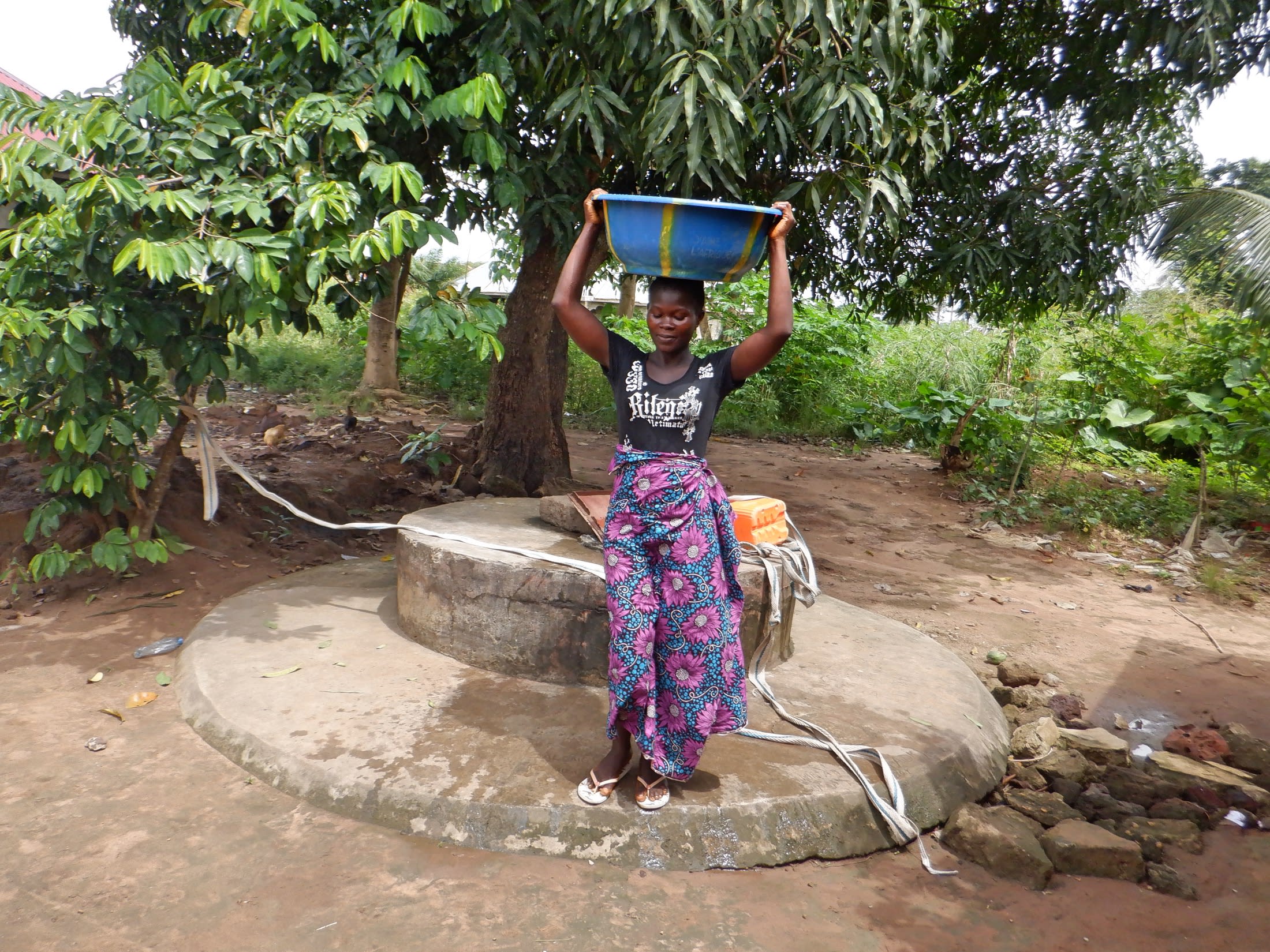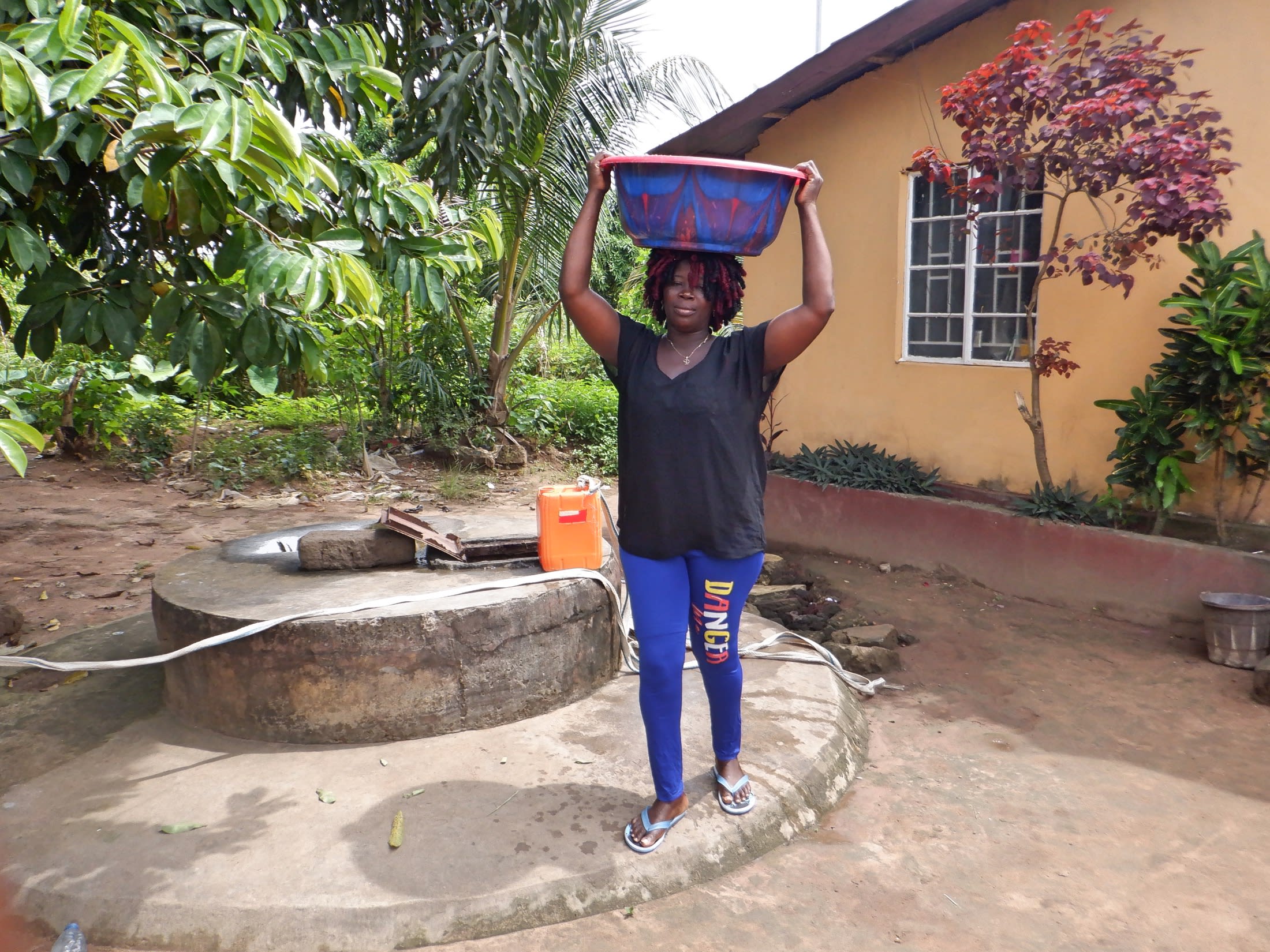There is no community well for the 137 people of Bombeh to use. Instead, they beg to fetch water from their neighbors' wells.
During the rainy season, community members often set out buckets to fill with rainwater. But during the driest months of the year, from March to May, people crowd at the private wells and can only fetch water at the whim of the owner.

"The water wells in this community are not open to us," said 15-year-old Yeanoh (shown carrying water above). "The owners cannot allow us to fetch water because they are afraid that the well will get a low quantity of water."
"The wells in this community are private and are restricted to access," said 30-year-old trader Manty Kamara (shown below). "Sometimes, I am embarrassed [about] the insults that I get from the owners of the private water wells for fetching water from these wells. There is no community water well in this community where I can get access to fetch water. It is more difficult to fetch water during the dry season when the water wells get dry."
“The ability to gain and maintain access to safe water sources is entangled with a host of issues that directly affect the water-fetchers and their everyday lives. Access is never fully secure, and has to be re-ensured and re-articulated over time and space. ....The owners may suddenly decide to not give any more water, or ration how much can be taken and when, or request favors in return. Each household without its own water source navigates such uncertainties and engages with new challenges as well as opportunities. A variety of factors come into play in producing everyday insecurities in water, and this has direct bearing on the ways that people relate to each other in a household and between households competing for the same water source.” - Farhana Sultana, Geoforum journal

Yeanoh would rather venture outside the community to public wells, but this means she takes a much longer time fetching water and needs to walk long, tiring distances.
"I fetch water every day to wash dishes, launder dirty clothes, to cook, and to drink," Yeanoh said. "Sometimes, my colleagues and I go far in search of water, and it is difficult to do more than a round trip of water from a far distance. I must fetch water after school to help my mother prepare food. I cannot be able to read my school notes at home because I am tired after I have fetched water from a long distance. I only have a limited time after I had completed fetching water in the evening."
But even in staying inside Bombeh, Manty doesn't seem to save much time, as she must wait in lines at the overcrowded private wells.
"I trade in the market square at Rotifunk," Manty explained. "I am worried about how I can get enough water to do all the daily activities at home. I cannot go out to trade in the morning without completing the household routines. I spend more time fetching water and get limited time to trade. I am more worried about the weekend because I must clean my house, launder dirty clothes, and prepare food for my family. These are all activities that cannot be completed without the use of enough water."
The people of Bombeh need a public well so the people who have water sources will no longer hold all of the power in the community.
What We Can Do:
New Well
Where we will be drilling is centrally located and will relieve many people of the long journey to fetch water and the challenge of accessing clean water.
Our team will drive over the LS200 mud rotary drill rig and set up camp for a couple of nights. Once the well is drilled to a sufficient water column, it will be cased, developed, and then tested. If these tests are positive, our mechanics will install a new India Mark II pump.
By drilling this borehole, the surrounding community will be provided with plenty of accessible, clean drinking water.
Training
There will be hygiene and sanitation training sessions offered for three days in a row.
Community members will learn how to make a hands-free handwashing station called the "tippy-tap." We will use these tippy taps for handwashing demonstrations and will also teach about other tools like dish racks and the importance of properly penning in animals. We will highlight the need to keep restrooms clean, among many other topics.
This training will also strengthen a water user committee that will manage and maintain this new well. They will enforce proper behavior and report to us whenever they need our help in solving a serious problem, like a pump breakdown.

 Borehole Well and Hand Pump
Borehole Well and Hand Pump
 Rehabilitation Project
Rehabilitation Project












